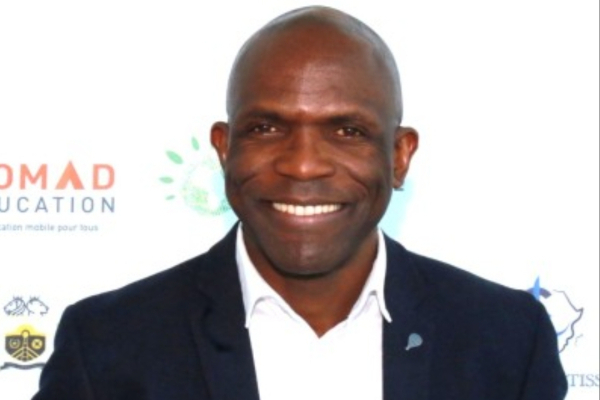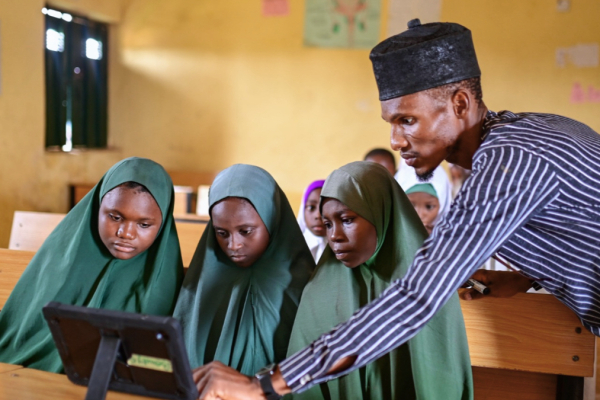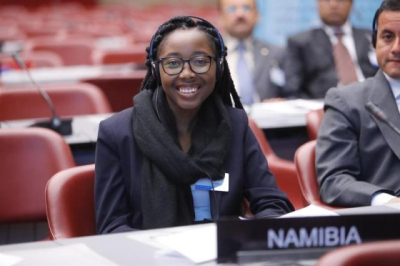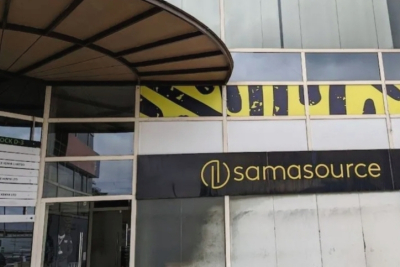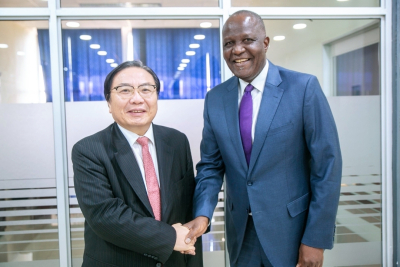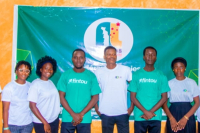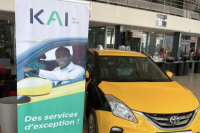With over 20 years of experience in the digital industry, he has initiated several investment projects, supported SMEs, and developed online payment solutions.
Eric Ntonfo (photo) is a Cameroonian expert in the digital economy and an entrepreneur. He is the founder and CEO of Kwendoo, an innovative startup in the online payment services sector that spans multiple areas.
Founded in 2014, Kwendoo provides an online crowdfunding platform that allows users to raise funds, contribute to gifts, support family events, and realize various projects. The company has also introduced Kwendoo Tickets, an online event ticketing platform that accepts payments in euros and CFA Francs through credit cards and mobile money. Additionally, Kwendoo Payments is designed for professionals and merchants within the African diaspora, facilitating remote payments for services.
In 2015, Ntonfo established Fiatope, where he currently serves as director. This crowdfunding initiative supports innovative small businesses with significant social impact in West and Central Africa, helping them secure essential funding for their growth. He also founded Fiatope Digital Solutions in 2017, which aids African small and medium-sized enterprises in their digital transformation.
Ntonfo is a board member at the University of the Mountains in Cameroon and serves as president of OrbitAfrica, an organization that promotes diaspora engagement in social and economic initiatives that benefit Africa. OrbitAfrica operates in France, Cameroon, Benin, and Senegal.
He holds an engineering degree in Internet and Telecommunications, which he obtained in 2001 from the National School of Engineering of Caen. Additionally, he earned an MBA in 2007 from the IAE School of Management in Poitiers and a master's degree in digital economy in 2013 from Telecom Paris.
Ntonfo began his professional career in 2002 at Orange, where he held various positions, including research and development engineer, head of the research, anticipation, and performance evaluation department for 3G/4G, national director of innovation in France, and product director.
Melchior Koba
According to the UN, Sub-Saharan Africa has the highest rates of educational exclusion in the world, with approximately 98 million children out of school. To address this issue, governments and various international partners are implementing several initiatives.
Chinese mobile phone manufacturer Tecno announced a partnership with the United Nations Children's Fund (UNICEF) on Thursday, July 18th, to support the "Nigeria Learning Passport" initiative. This digital learning platform aims to provide educational opportunities for children across Nigeria, particularly those residing in remote and underserved areas.
"Digital learning is a powerful tool in bridging educational gaps and ensuring that every child has the opportunity to learn and thrive. With TECNO's support, we are one step closer to our goal of making education accessible to all children in Nigeria, empowering them to build a brighter future," said Cristian Munduate, Unicef's representative in Nigeria.
Nigeria, like many African nations, grapples with a high rate of out-of-school children. Data from UNICEF published in 2022 reveals approximately 18.3 million children are not enrolled in school, placing Nigeria among countries with the world's highest number of out-of-school children. Insecurity is cited as a primary driver of this situation.
To address this educational crisis, the Federal Ministry of Education and UNICEF launched the "Nigeria Learning Passport" program in 2022, aligning with UNICEF's global education strategy established in 2018. The program aims to further close the educational gap and improve education quality by expanding to include offline content for 50,000 children in remote and low-income areas in 2024.
The partnership with Tecno is expected to accelerate this progress by strengthening content development, facilitating the purchase and maintenance of technical equipment, and providing professional training for educators. Notably, the program has already seen significant growth, expanding to 19 Nigerian states and registering approximately 888,000 users, ranking Nigeria second in participation globally.
Samira Njoya
Namibia has begun implementing a cybersecurity strategy to increase cybercrime awareness, protect children online, and strengthen cybersecurity laws.
Deputy Minister of Information and Communication Technology Amutse Modestus announced the initiative at the 4th Annual International High-Level Cybersecurity Conference in Windhoek, held on 17-19 July.
The National Cyber Security Strategy and Awareness Creation Plan focuses on protecting vulnerable populations, especially children.
Data annotation and model validation firm Sama has partnered with the University of Nairobi (UoN) to advance Kenya’s Generative AI (GenAI) sector.
The collaboration will provide UoN students and faculty with part-time job opportunities at Sama, including training, equipment, and workspaces. Sama will provide training, equipment, materials, and workspaces to support this collaboration.
The Green Innovation Hub (GiH) at the African Centre for a Green Economy is now inviting applications for its Just Transition Innovation Program (J-TIP). The 6-month business incubation program seeks green enterprises ready to advance Africa’s climate action and low-carbon transition.
J-TIP will support participants with business development training, personalized coaching, and increased visibility. The program also offers mentorship, funding opportunities, and networking with investors.
Applications are open until July 31.
Investing in digital infrastructure improves internet access across the continent, especially in underserved rural areas. This increased connectivity is crucial for integrating more people into the digital economy, reducing the digital divide, and promoting social inclusion.
The World Bank has pledged US$100 million to accelerate Zambia's digital infrastructure and expand internet access through the Digital Zambia Acceleration Project (DZAP), Minister Felix Mutati announced on July 19 on X. This initiative aims to bolster the country's digital capabilities and enhance access to digitally enabled services.
World Bank Managing Director and Chief Administration Officer Wengcai Zhang announced the project during his visit to Lusaka, where he met with Technology and Science Minister Hon. Felix Mutati. Zhang highlighted that the project will be funded through national and regional IDA funds, supplemented by US$20 million in unguaranteed commercial financing.
"The Digital Zambia Acceleration Project is designed to increase internet access and enhance digitally enabled services," said Zhang. "It aligns with government priorities and will focus on expanding broadband and last-mile infrastructure. Additionally, it will deploy digital public infrastructure to improve efficiencies in both the public and private sectors."
The DZAP will also target high-impact sectors to support digitalization and nurture employment-ready digital skills. The project is expected to be approved by the World Bank Board in March 2025. In the meantime, a Project Preparation Advance of US$6 million has been allocated to finance preliminary activities.
A Project Implementation Unit will be set up within the Smart Zambia Institute to manage and drive the government's digitization efforts. The World Bank also expressed support for Zambia hosting the World Skills Africa Competition in Livingstone in April 2025, with Zhang emphasizing the event's importance on a global scale.
This initiative aligns with Zambia's goals of creating a more inclusive and equitable society through technology, which is crucial for the country's sustainable development. According to the Zambia Inclusive Digital Economy Status Report 2022, the country's digital economy is still in its nascent stages, with a digital economy score of 45 percent and a significant digital divide. Currently, 47 percent of Zambians are not digitally included, with 56 percent of rural residents lacking digital inclusion. The report underscores the urgent need for digital transformation to improve economic participation and national development
Hikmatu Bilali
Since the COVID-19 pandemic, online training courses have become an appealing alternative for acquiring skills. They are particularly accessible due to the flexibility they offer learners.
Blemama is an edtech solution developed by a Beninese startup, providing users with access to online training in various fields. Based in Cotonou, the startup was founded in 2019 by Martinien Blévenec.
The platform does not have a mobile application; users must access the services directly through the web platform. While browsing the platform is possible without an account, creating one is necessary to purchase courses. Blemama offers training in digital marketing, coding, graphic design, cryptocurrency, and e-commerce.
In addition to these courses, the startup features a "Tech Room," a program that allows users to join a private community of technology enthusiasts and access a pack of tailored training courses. The goal is to help users achieve their objectives through customized training. Within the community, users can request training in specific key areas. These sessions are conducted online, and users who are unavailable at the time can later access the video recordings. The monthly subscription fee is XOF20,000 (approximately $33). Blemama also offers a subscription to the "Tech Room" without access to the training pack for XOF5,000.
Regarding payment methods, the startup has integrated mobile money payments, bank cards, and cryptocurrencies. Additionally, individuals can become trainers on Blemama by clicking on the "Trainer" tab and conversing with Liam, the startup's AI-based chatbot. Blemama claims to have trained over 25,000 young people and has more than thirty trainers.
In 2024, Blemama was selected, along with five other Beninese edtech startups, to join the first cohort of the Mastercard Foundation EdTech Fellowship program. This eight-month acceleration program offers mentorship, expert advice, and non-equity funding of $75,000.
Adoni Conrad Quenum
African countries fully recognize the benefits that digitization can bring to their economies. They are now committed to seizing these opportunities with determination to maximize the advantages.
Last Friday, July 19th, Colonel Assimi Goïta (photo), President of the Malian Transition, launched the first phase of a program that allows citizens to pay for certain services using their mobile phones.
This initiative, unveiled in President Goïta's speech on June 22nd, 2024, in Sikasso, marks a turning point in Mali's administrative landscape. Initially deployed in the capital city of Bamako, the program will eventually expand to encompass all regions and diplomatic missions. Additionally, the scope of services covered will progressively include taxes and public procurement.
"This initial phase represents a cornerstone. It will be gradually extended to all regions of Mali and diplomatic representations, while progressively integrating all public services, including taxes and public procurement," indicates a presidential statement.
The mobile payment system aligns with a broader vision for Mali's development and modernization, where technological innovation takes center stage. The program aims to streamline administrative procedures, expedite processing times, and optimize the collection of public revenue. Furthermore, it seeks to enhance citizen trust in public institutions by fostering a more transparent and efficient management system.
Mali has historically lagged behind in digitizing public services. In 2022, the United Nations' E-Government Development Index ranked the country at 178th globally. This new initiative, therefore, represents a critical step towards closing the gap and ushering in a more modern administrative system.
Samira Njoya
Inspired by the idea of "Finance for All," Fintou was founded by two tech entrepreneurs to empower entrepreneurs.
Fintou is a fintech solution developed by a Togolese startup that enables users to create and launch crowdfunding campaigns. Founded in 2022 by Kokou Nouvor and Fandam Tahalgbanti, the startup is based in Lomé.
"Fintou was born out of a need for financing to realize a business idea. During our search for funding, we discovered crowdfunding, an alternative financing method that mobilizes interested individuals to finance a project. This inspired us to create a similar platform and test the concept," the founders explained told Togo First.
The solution is accessed through a web browser, as there is no mobile app available. Users can create an account by clicking the "Start" button and entering their information. The startup verifies this information before validating the account. Once verified, users can launch funding campaigns for various projects, set up funds for birthdays or weddings, or organize donations.
"Depending on your project, invite close acquaintances to participate, then expand to your broader network and share the project on social media and with the general public. Regularly update your fundraising page to keep contributors informed," the startup advises.
To facilitate fund collection, Fintou integrates mobile money and bank card options. The fintech offers three subscription plans: free, pro, and expert. The free plan allows collections up to XOF3 million (approximately $5,000). The pro subscription costs XOF20,000, while the expert plan requires a specific request to the startup for pricing details.
Adoni Conrad Quenum
Launched by two youg entrepreneurs, the e-mobility solution aims to facilitate travel in and around the city of Dakar.
Kai is an e-mobility solution developed by a Senegalese startup that enables users to book rides in the city through a mobile app. Founded in 2018 by Pape Seyni Ndiaye and Birane Diagne, the startup is based in Dakar and secured an undisclosed amount of funding in 2021 to support its growth.
The app, available on both iOS and Android, has garnered over 10,000 downloads on the Play Store. Users can create an account by providing their personal information, which allows them to access the startup's services. To book a ride, users select their destination on the map and choose a vehicle type, with the fare displayed upfront.
Kai also allows users to learn more about their drivers. Once a ride is confirmed, users receive a notification when the driver arrives. They can follow a designated route but have the option to add stops or make detours during the journey. For payment, Kai offers several methods, including a preloaded digital wallet, bank cards, mobile money, and cash.
"Kai's services include rides within Dakar, transfers to and from Dakar Airport, and availability for trips within Dakar and to all regions," the startup states. To accelerate its growth, Kai has partnered with CFAO Motors, a vehicle dealership. At its launch in December 2021, this partnership provided the startup with 20 cars.
Adoni Conrad Quenum
More...
A robotics enthusiast and inventor, he has created a popular game robot and developed a tech platform that streamlines data collection for scientists.
Silas Adekunle (photo) is a prominent Nigerian inventor and tech entrepreneur specializing in robotics. He is the co-founder and CEO of Reach Industries, a company focused on assisting scientists and improving laboratory efficiency to address global challenges swiftly.
Founded in 2020 and based in the UK, Reach Industries offers advanced technological services to STEM (science, technology, engineering, and mathematics) companies. One of the startup's key innovations is Lumi, an intelligent platform that employs computer vision, voice recognition, and machine learning to capture and analyze operational data.
Lumi serves as a comprehensive assistant throughout the life sciences development process, from research to production. It automates data collection from experiments, observations, and equipment usage, among other functions. This automation saves valuable time, allowing scientists to concentrate on more significant issues while enhancing the reproducibility of their results.
In addition to his work at Reach Industries, Silas Adekunle founded Awarri, a company that leverages artificial intelligence and robotics to provide educational tools and develop sustainable technological solutions for Africa. Awarri aims to create an ecosystem that prepares young people for the future workforce.
Before these ventures, Adekunle co-founded Reach Robotics in 2013, which gained recognition for inventing MekaMon, a gaming robot integrated with a STEM education platform. In 2017, Apple signed an exclusive distribution agreement with Reach Robotics, impressed by the product.
Silas Adekunle earned a bachelor's degree in robotics technology from the University of the West of England in 2014. During his studies from 2012 to 2014, he designed and launched extracurricular robotics sessions.
To gain experience in robotics, he began as a volunteer intern at RustySquid, a robotics company, in 2011. He then served as a verification engineering intern at Infineon Technologies, a semiconductor manufacturer, in 2012, followed by a software internship at GE Aerospace in 2013.
In 2018, Silas Adekunle was recognized on the Financial Times list of the top 100 minority ethnic leaders in technology in the UK. That same year, he was selected for Forbes' 30 Under 30 Europe in the technology category.
Melchior Koba
As a financial analyst, he leads an innovative company that uses technology to promote financial inclusion in Egypt. His company facilitates access to credit for consumers by working directly with merchants.
Amr Sultan (photo), an Egyptian finance expert and entrepreneur, is the co-founder and CEO of Blnk, a fintech company dedicated to enabling financial inclusion through point-of-sale financing.
Founded in 2021, Blnk specializes in providing consumer credit to underserved populations. The company allows consumers to instantly obtain credit from their favorite merchants and pay in installments over a period of up to 36 months. The credit purchase process through Blnk requires only a national ID card.
Prior to co-founding Blnk, Amr Sultan co-founded Akanar Partners in 2009. As the managing director until 2016, he led this corporate finance and mergers and acquisitions advisory firm, providing services in corporate finance, M&A advisory, fundraising, and structured finance. Akanar Partners was subsequently acquired by Arqaam Capital, an institutional investment bank.
Amr Sultan holds a bachelor's degree in business administration, earned in 1998 from the American University in Cairo. He also became a Chartered Financial Analyst (CFA) in 2001, certified by the CFA Institute.
Sultan began his professional career in 2000 at HC Securities & Investment, an investment bank, as an equity research associate. From 2003 to 2009, he served as co-head of investment banking at Beltone Financial, a financial services provider.
Melchior Koba
His mission is to empower the next generation by equipping them with the technological skills they need to thrive in the modern world. He accomplishes this by designing educational programs for schools, ensuring children receive this training in an innovative and impactful way.
Yaakoub Benarab (photo) is an Algerian tech entrepreneur and the founder and CEO of Snai3i, a company dedicated to transforming education in the Middle East and North Africa (MENA) region.
Founded in 2019, Snai3i develops educational programs aimed at simplifying advanced technologies for children. The company offers schools courses in mobile programming, artificial intelligence, Python, 3D modeling, and mechatronics, all tailored specifically for young learners. It provides schools with immediately usable programs and trains teachers in effective pedagogical methods and course design. Additionally, the platform enables experts to create and publish their own courses. To date, the startup has successfully trained 872 students.
Beyond his role at Snai3i, Benarab serves as an information technology instructor at the Higher Institute of Sciences (HIS), a multidisciplinary private university in Algeria recognized by the Ministry of Higher Education and Scientific Research. He is also an ambassador for One Young World, a global community of young leaders.
Benarab graduated from the National Polytechnic School in 2019 with a master's degree in control systems. He also holds a master's degree in learning design and technologies from Arizona State University, which he obtained in May 2024.
In June 2019, he represented The European Wergeland Centre, a European research organization focused on education for intercultural understanding, human rights, and democratic citizenship. By October 2019, he had taken on the role of director at KnowLab, a coworking space. In 2020, he worked as a technology and innovation specialist at the Africa Crisis Hub, which provides public health advisory services.
Melchior Koba
Improving digital infrastructure in Africa provides robust and reliable cloud services that meet international standards. This enhancement is crucial for the region's digital economy, promoting better internet connectivity and data management.
Schneider Electric and IXAfrica Data Centres have launched East Africa’s largest hyper cloud data centre, NBOX1, in Nairobi, Shneider Electric announced July 18. The Tier 3+ facility is now operational, offering a carrier-neutral, AI-ready environment for cloud, colocation, and connectivity services.
Powered by Schneider Electric's MV and LV switchgear and Kenya's renewable energy, NBOX1 promises stable and reliable services. It aims to attract hyperscale and internet customers with a performance on par with top facilities in North America and Western Europe.
“We believe that sustainable practices are essential for the future of data centres, and we are proud to partner with organizations like IXAfrica to create environmentally conscious and innovative digital habitats for the evolving technological landscape," said Mouna Essa Egh, Schneider Electric’s secure power VP for the Middle East & Africa
The data centre, backed by a $50 million investment from Helios, is strategically located in Africa’s 'Digital Savannah,' serving over 300 million people and a vibrant tech ecosystem.
This development is significant for Africa's digital growth. According to Africa Data Center Market Analysis (2017-2029) by Mordor Intelligence, the Africa Data Center Market is projected to have a capacity of 0.69 thousand MW in 2024 and is expected to grow to 1.23 thousand MW by 2029, with a CAGR of 12.34%. Additionally, the market is forecasted to generate colocation revenue of USD 750.2 million in 2024, reaching USD 1,709.6 million by 2029, growing at a CAGR of 17.91% during this period. The launch of NBOX1 is a crucial step in enhancing the technological capabilities and connectivity in East Africa, fostering further development in the region's digital landscape
Hikmatu Bilali


